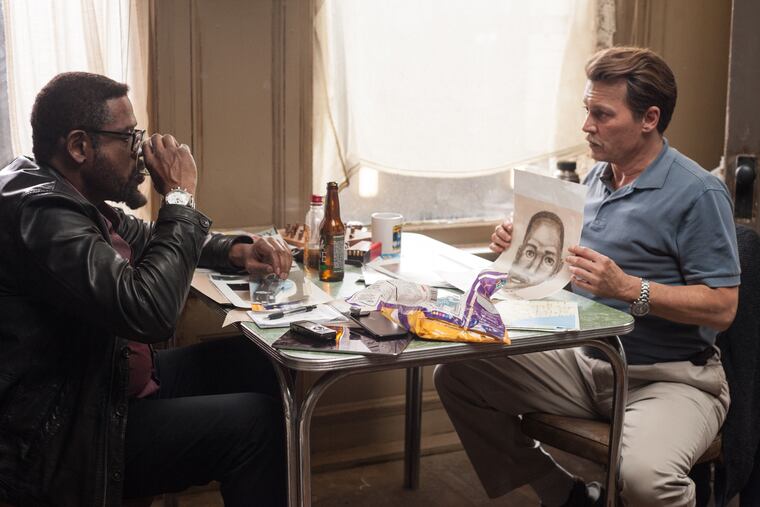Philly director digs into unsolved Notorious B.I.G. murder in ‘City of Lies’
Director Brad Furman’s movie stars Johnny Deep and Forest Whitaker, with the late rapper’s mother Voletta Wallace appearing as herself.

Who killed the Notorious B.I.G.?
Brad Furman has a strong suspicion, and he’s ready with a three-word response to people’s questions about the 1997 murder of rapper Christopher Wallace, who was shot to death in Los Angeles just six months after Tupac Shakur met the same fate in Las Vegas.
“Watch the movie,” says the Philadelphia-born movie director, speaking of City of Lies, his new crime procedural — based on a true story, but with fictional elements — that stars Johnny Depp and Forest Whitaker.
Depp’s character is based on the late LAPD detective Russell Poole and his efforts to get to the bottom of the case. Whitaker’s character is a made-up journalist loosely based on a real author.
City of Lies concerns the decades-long investigation of the death of Wallace, also known as Biggie Smalls, the New York rapper beloved for such enduring hits as “Juicy” and “Hypnotize.” The movie, based on the 2003 nonfiction book LAbyrinth by Randall Sullivan, depicts a corrupt Los Angeles Police Department that, after nearly a quarter century, has still never officially solved the mystery.
“A murder like that only goes unsolved,” Depp says as the Poole character, “if the police don’t want to solve it.”
Furman made the movie with full cooperation of Voletta Wallace, the mother of the rapper, who plays herself in the film, now out on video-on-demand after a three-year delay from its original 2018 release date.
From Lafayette Hill to ‘City of Lies’
For Furman, who grew up in Lafayette Hill and graduated from Friends’ Central School, City of Lies is the follow-up to The Infiltrator, his 2016 film starring Bryan Cranston. That drug-world thriller featured a screenplay by Furman’s mother, Ellen Brown Furman, a lawyer who hammered out the script at the family beach house in Ventnor.
The director had his biggest commercial success with The Lincoln Lawyer, starring Matthew McConaughey in 2011.
» READ MORE: Philly director Brad Furman and his screenwriter mom make movie history with 'The Infiltrator'
For Depp, the movie’s streaming release follows his loss in British court last year in a libel suit against the The Sun for a story alleging he had assaulted ex-wife Amber Heard, and a refusal by the court last month to rehear the case on appeal. Depp has denied the assault. In the United States, he is suing Heard for defamation in a different matter in a case that is scheduled for April 2022 in Virginia.
Depp is being sued in Los Angeles for allegedly punching location manager Gregg “Rocky” Brooks on the City of Lies set in 2017. Furman won’t comment on the case, which is ongoing, except to say, “I didn’t see him punch anyone.”
Furman spoke with The Inquirer on Zoom from his home in Los Angeles wearing a Philadelphia Eagles sweatshirt, with his vinyl collection visible in the background.
His Biggie and Tupac passion goes back to seeing Wallace in a club in New York while a film student at New York University. He remembers pulling his car over on the Schuylkill Expressway when he heard the news of Shakur’s death on the radio.
Early Philly music memories include seeing Kool & the Gang in Atlantic City and Jodeci opening for Boyz II Men at the Spectrum. “I love the way music demarcates time,” he says. He directed 50 Cent and Justin Bieber videos before breaking into movies.
Biggie and Tupac in pop culture
Wallace and Shakur’s stories have been thoroughly explored in popular culture, from Nick Broomfield’s 2002 Biggie and Tupac to the USA Network’s 2018 dramatic series Unsolved to the 2019 National Public Radio podcast Slow Burn.
City of Lies comes at things via Sullivan’s LAbyrinth book, with its mouthful of a subtitle: A Detective Investigates the Murders of Tupac Shakur and Notorious B.I.G., the Implication of Death Row Records’ Suge Knight, and the Origins of the Los Angeles Police Scandal.
The director developed a close relationship with Voletta Wallace, who permitted use of her son’s a cappella vocals, which are featured to haunting effect. In the movie, no actor actually “plays” the rapper: Except in a few shots in silhouette or profile, the images of B.I.G. and Shakur shown are of the late rappers themselves.
When Furman first suggested Wallace play herself, “she laughed me off the phone and told me to go call Angela Bassett,” he says.
“But we built a beautiful and trusting relationship. ... Miss Wallace is an incredibly inspiring woman. Having her in the movie was crucial for me. I didn’t want to make a movie that exploited the murder of Christopher Wallace. I wanted to make a movie that honored him and Tupac.”
The movie, he says, “is about a failure of institutions. We invest in the police to protect and serve and think that these individuals are going to do their job honorably, and when they don’t, there’s a lot of dirty secrets that have to be hidden.”
But he’s also thrilled to finally tell the story of the rapper from a human perspective.
“With the iconography of stardom, we forget these people are human,” Furman says. “This was a young man, a young Black man who lost his life, who was murdered .... This is a real life we’re dealing with, and there’s a responsibility I felt I had to honor.”